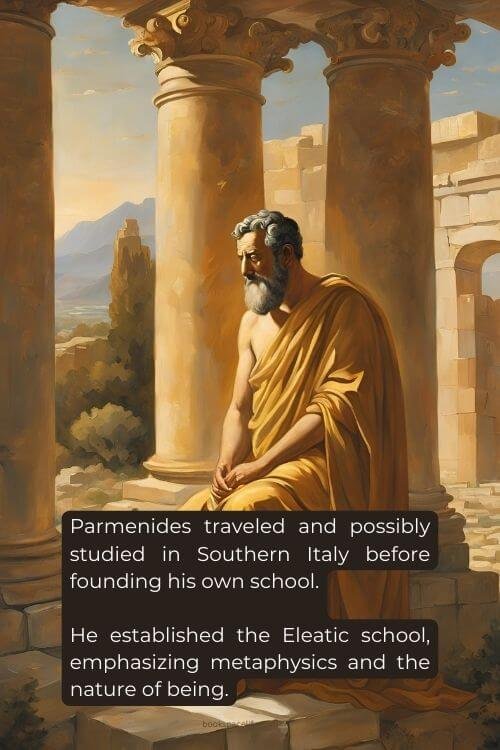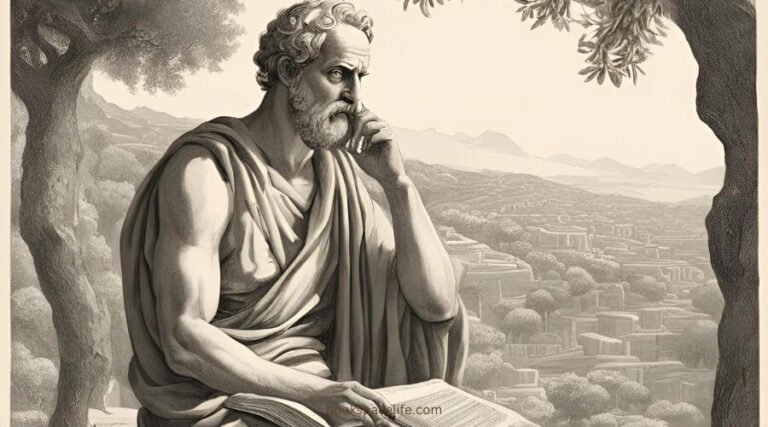Thales of Miletus
Parmenides: The Philosopher of Being and Reality
Parmenides of Elea (515 – 450 BCE) stands as one of the most significant figures in the history of Western philosophy, primarily known for his profound ideas regarding the nature of existence and reality.
His work marks a pivotal shift in philosophical thought from the pre-Socratic focus on the natural world to a more abstract inquiry into the nature of being.
Through his revolutionary ideas, Parmenides laid the groundwork for metaphysics and epistemology, profoundly influencing subsequent philosophers, including his most famous student, Zeno of Elea.
This blog post explores Parmenides’s life, travels, early education, philosophical contributions, and his lasting impact on philosophy.
Quick Read
Table of Contents
(1) Early Life and Education
Parmenides was born in Elea, a city in southern Italy, around 515 BCE.
Elea was a thriving center of trade and culture in ancient Greece, known for its rich intellectual climate.
Very little is known about Parmenides’s family background or early education, but it is believed that he came from a prominent family that allowed him access to the educational opportunities of the time.
Although specific details regarding his education are sparse, Parmenides is often associated with the teachings of the Pythagoreans, who emphasized mathematics, harmony, and the idea of a transcendent reality beyond the physical world.
This influence may have contributed to Parmenides’s eventual philosophical orientation toward abstract concepts and the nature of existence.
In his youth, Parmenides may have traveled to various regions, seeking knowledge and engaging with different philosophical ideas, although specific accounts of these travels are not well-documented.

(2) Philosophical Development
Parmenides’s philosophical development was significantly shaped by the intellectual milieu of his time.
He became a prominent figure in the Eleatic school of philosophy, which emphasized the importance of rational thought and the rejection of the senses as a means of acquiring knowledge.
Parmenides’s major work, a poem titled “On Nature,” is often considered one of the most important philosophical texts from ancient Greece. This poem is divided into two parts: the “Way of Truth” and the “Way of Opinion,” each presenting contrasting views on the nature of reality.
(3) Philosophical Contributions
- The Way of Truth: In this section of his poem, Parmenides presents his central thesis: that “what is, is” and “what is not, is not.”
He argues that existence is unchanging, eternal, and indivisible. According to Parmenides, any perception of change or plurality is illusory, and true knowledge can only be attained through reason and rational thought.
This emphasis on the primacy of being over becoming challenges the conventional views held by earlier philosophers, who focused on the observable world.
- The Way of Opinion: In contrast to the “Way of Truth,” the “Way of Opinion” describes the beliefs and perceptions held by ordinary people.
Parmenides criticizes the reliance on sensory experience and opinion, asserting that these lead to false conclusions about the nature of reality.
He highlights the distinction between the deceptive world of appearances and the unchanging reality of being, suggesting that most people are misled by their senses.
- Rejection of Change: One of Parmenides’s most radical assertions is his rejection of change and motion.
He argues that if change were real, it would imply that something could come into existence from nothing or cease to exist altogether, both of which he considers logically impossible.
This idea directly contradicts the views of other pre-Socratic philosophers, such as Heraclitus, who emphasized change as fundamental to reality.
Parmenides’s argument posits that if change were possible, it would lead to contradictions, and thus, the concept of change must be dismissed.
- Unity of Being: Parmenides asserts that being is one and cannot be divided into parts.
He argues that the notion of multiplicity or plurality is an illusion, as true existence must be whole and undivided.
This idea of the unity of being influenced subsequent philosophical thought, leading to discussions on the nature of reality, existence, and the concept of substance.
- Influence on Logic and Metaphysics: Parmenides’s emphasis on reason and logical deduction laid the groundwork for the development of formal logic and metaphysics in Western philosophy.
His ideas about being and non-being set the stage for later philosophical inquiries, particularly in the works of Plato and Aristotle.

(4) Influence and Impact
Parmenides’s contributions to philosophy had a profound and lasting impact, shaping the trajectory of Western thought in various ways:
- Influence on Later Philosophers: Parmenides’s ideas greatly influenced subsequent philosophers, particularly Plato and Aristotle.
Plato’s theory of Forms, which posits a realm of unchanging, perfect entities, can be seen as a response to Parmenides’s assertions about the nature of being.
Aristotle also grappled with Parmenides’s ideas, particularly in his discussions on substance, essence, and change.
- Foundation for Metaphysics: Parmenides is often regarded as a foundational figure in metaphysics, as his inquiries into the nature of being and existence paved the way for later philosophical explorations.
His distinction between appearance and reality has been central to metaphysical discussions throughout the history of philosophy.
- Impact on Epistemology: Parmenides’s rejection of sensory experience as a reliable source of knowledge challenged the prevailing views of knowledge and perception.
His emphasis on reason as the primary means of understanding reality influenced the development of epistemology, particularly in the context of skepticism and the limits of human knowledge.
- Legacy in the Eleatic School: Parmenides is considered one of the founders of the Eleatic school of philosophy, which included his most famous student, Zeno of Elea.
Zeno’s paradoxes, which challenge the concepts of motion and plurality, directly stem from Parmenides’s ideas about the unity of being and the illusory nature of change.
- Cultural and Historical Significance: Parmenides’s life and work reflect the rich intellectual culture of ancient Greece, characterized by a quest for knowledge and a willingness to challenge established beliefs.
His contributions represent a pivotal moment in the history of human thought, marking a transition from mythological explanations of the world to rational, systematic inquiries.
- Recognition of Rational Inquiry: Parmenides’s emphasis on reason as a means of understanding the nature of existence established a precedent for future philosophical inquiry.
His work encourages individuals to engage in critical thinking and to seek knowledge beyond mere sensory perception, laying the groundwork for the philosophical traditions that followed.
(5) Conclusion
Parmenides of Elea emerges as a crucial figure in the evolution of philosophical thought, whose insights into the nature of being, change, and reality continue to resonate in contemporary discussions.
His rejection of sensory experience and emphasis on the primacy of rational thought transformed the landscape of philosophy, influencing later thinkers and shaping the course of Western thought.
Through his reflections on the nature of existence, Parmenides challenged conventional beliefs and encouraged individuals to seek deeper truths about reality.
His legacy endures in metaphysical discussions, epistemological inquiries, and philosophical explorations, reminding us of the enduring quest for knowledge and understanding that characterizes the human experience.
As we contemplate Parmenides’s life and teachings, we are invited to consider the complexities of existence and the nature of reality.
His work serves as a testament to the power of philosophical inquiry and the importance of engaging critically with our beliefs, inspiring us to seek clarity amidst the uncertainties of life.
(A) 7 Quick Facts on Parmenides
- Born in Elea – Parmenides was born around 515 BCE in the Greek city of Elea (Ancient Italy; modern-day Italy)
- Student of Xenophanes – He was influenced by Xenophanes, an early philosopher and poet.
- Traveled to Southern Italy – Parmenides traveled and possibly studied in Southern Italy before founding his own school.
- Founded Eleatic School – He established the Eleatic school, emphasizing metaphysics and the nature of being.
- Believed in “Being” as Unchanging – Parmenides argued that true reality is unchanging, denying the reality of change and motion.
- Famous Poem – His ideas are expressed in his philosophical poem, On Nature.
- Influenced Plato – His views on reality profoundly influenced Plato and Western metaphysics.
(B) 10 Quotes attributed to Parmenides
- What is, is; what is not, is not. A fundamental assertion about the nature of existence and reality.
- Change is an illusion. Parmenides believed that true reality is unchanging and eternal.
- To think and to be are the same. Suggesting that thought and existence are intertwined.
- There is no such thing as nothing. Arguing against the existence of emptiness or void.
- The path of truth is the only way to knowledge. Emphasizing the importance of seeking truth and understanding.
- For the same thing can be thought and can be. Highlighting the relationship between thought and existence.
- It is necessary to speak the truth, for it is the only path. Advocating for truthfulness as essential for understanding reality.
- The one is unchanging and indivisible. Describing his view that true being is singular and constant.
- He who knows the truth is unerring. Suggesting that knowledge of the truth leads to certainty.
- There is no way to truth but through the mind. Indicating that understanding and reason are essential for grasping reality.








